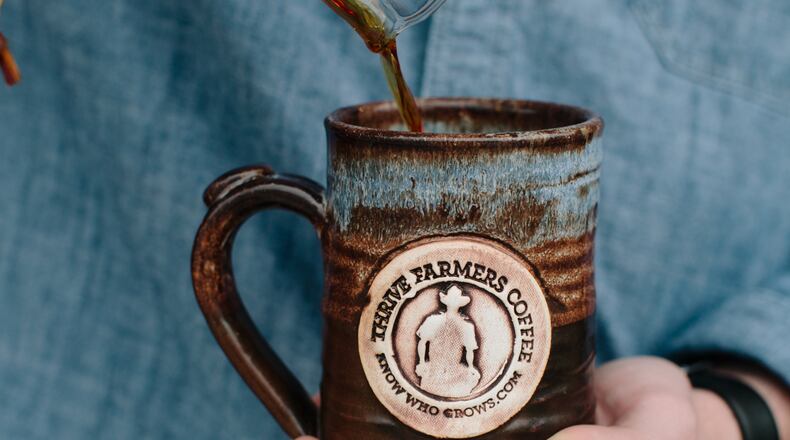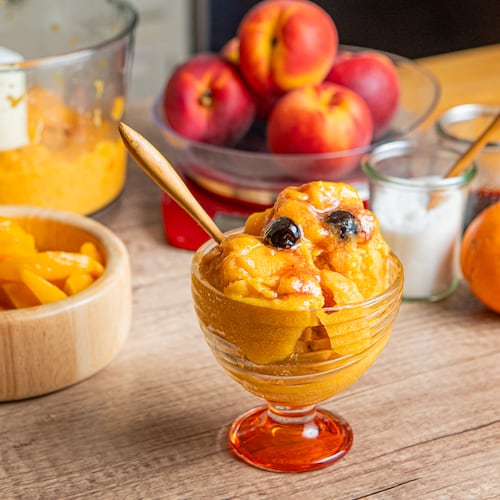You don't need to talk to Vinicio Gonzalez to see his passion in harvesting coffee. It radiates through the weathered appearance on his face. You can feel it when you shake his calloused hands, and it shows in his eyes that glisten with prideful tears whenever he talks about his role as a coffee producer for THRIVE Farmers ™.
"Before THRIVE, we had intermediaries who would negotiate between us farmers and the buyers. We worked without passion because there was no stable line. Prices would go up one year then they would drop the next year. We were just working to work," Gonzalez explained. "But THRIVE Farmers came in and they were honest with us. They were warm and made us feel like part of the family."
Credit: Alexa Lampasona
Credit: Alexa Lampasona
Gonzalez has partnered with THRIVE Farmers for two years. Since then he has increased yields and gained up to ten times more in profits from selling his red coffee cherries, thanks to THRIVE Farmers’ revenue-sharing model. And it shows in Gonzalez’s dedication. After a full day of harvesting coffee, he drives three hours each way to deliver his red coffee cherries to the mill for processing, before the green coffee beans are then exported to the United States.
The care that Gonzalez puts into his coffee is common throughout all of THRIVE Farmers' partnerships. It boils down to the THRIVE Farmers platform. Farmers are invested in the whole value chain of coffee production, and they remain stakeholders of their coffee from harvest through to the end sales. It results in 75 percent of green coffee and 50 percent of roasted coffee revenue going directly back to the farmer. Traditionally, coffee farmers would receive mere pennies in net profit for their work.
"As the revenue model grows, the need for their specialty coffee will grow," said Tracy Allen, the Chief Coffee Officer of THRIVE Farmers. "We have created an effect where farmers want to create better products. Not only do they have more money to invest in farming, but they have passion."
Allen has been in the coffee industry for 27 years, and he has seen it come to fruition. He has worked for Proctor and Gamble, developing the Folgers and Millstone brands, and he founded a coffee consulting company Brewed Behavior. Allen joined THRIVE Farmers in January of 2014, and he works with the agronomists and farmers to ensure the highest quality standards of coffee are produced. This involves going to origin countries and examining soil samples, analyzing weather patterns and providing feedback on how farmers can harvest better coffee. It was Allen who created a profile specific for Chick-fil-A, vetting out more than 50 other coffee companies.
Credit: Alexa Lampasona
Credit: Alexa Lampasona
"It becomes a big challenge culturally, because you have farmers who have run a mill for 25 years, and then I come in to teach them how to run their mill better," Allen said. "I've been in the industry for so long, I can tell how much care went into the coffee based on just looking at the green coffee beans."
THRIVE Farmers' coffee is a small segment of coffee that adheres to specific specialty-coffee standards implemented by the Specialty Coffee Association of America. Only 10 percent of the coffee around the world meets these standards. THRIVE Farmers' coffee is cupped or tasted for specific defects up to 15 times before it is sold as specialty grade.
Specialty coffees have the strictest standards for coffee defects. Just one black bean in a green coffee sample messes up the entire batch of coffee beans, and the coffee is not labeled specialty.
Since Allen has been in the coffee industry, he has watched how coffee-producing countries were exploited. "I watched companies spend more money on the marketing than the coffee itself. No one cared what the coffee tasted like. The work of the farmer meant nothing because they were underpaid for it."
For a farmer like Gonzalez, in the past he would sell his coffee for a lower price than its value. After selling his beans, he never saw them again. However THRIVE Farmers has built a model based on trust and transparency. Gonzalez has open dialogue with the consumer and has seen his coffee come full circle; he grew it, had the opportunity to see it roasted, and he has tasted it.
About the Author
The Latest
Featured




